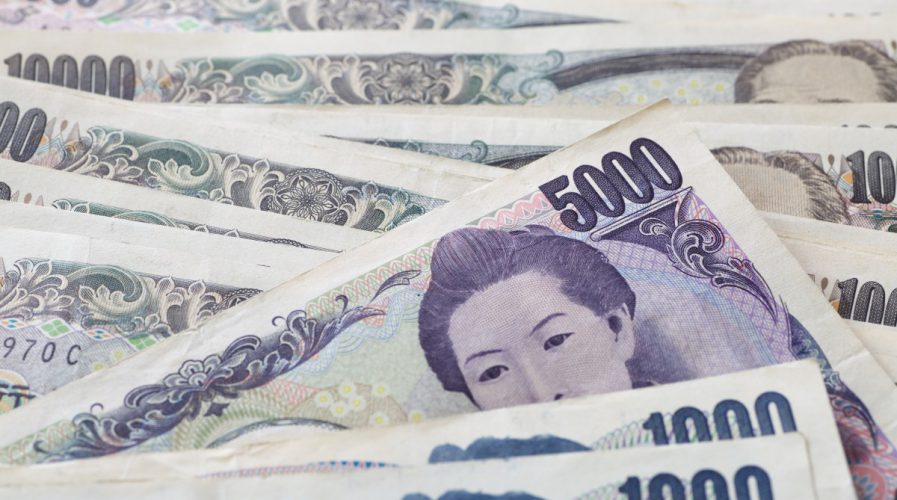
Japanese banks could turn to fintech for a new source of revenue. Using blockchain technology could reduce costs and increase convenience when carrying out wire transfer processes. Source: Sakarin Sawasdinaka/Shutterstock
Japanese banking consortium continues push into fintech, turns to blockchain
A consortium of Japanese banks are experimenting on a new fund transfer system based on blockchain technology in a bid to spur growth in the fintech sector, while also driving down costs and increasing security.
Central Bank Digital Currency Brings Wider Access: Bank of Japan https://t.co/rWw2sfambN #fintech pic.twitter.com/NRKWjZ6vcL
— David Pearce (@_fintechinvest) April 30, 2017
Blockchain technologies will allow these banks to develop more convenient and low-cost processes for wiring money to a society where cash is still king. Recently, a provision in the Japanese Banking Act that prevented banks from owning more than 5 percent of technology companies was revised as part of a push to find new profit sources.
The consortium is led by SBI Holdings and SBI Ripple Aisa, who—as of Wednesday—have roped in 56 members to join them in their endeavor, including recent additions such a MUFG unit Bank of Tokyo-Mitsubishi UFJ and Shiga Bank.
SEE ALSO: Japan frees up millions for potential fintech investments after law alteration
The consortium will be running tests of blockchain technologies’ suitability for wiring money, and the first test will be designed to examine the time, cost and convenience of virtual currencies. The upcoming test will only feature a handful of those members—including Mizuho Financial Group, Resona Holdings’ Resona Band and Concordia Financial Group’s’ Bank of Yokohama—but it’s expected that future tests will include more and more members in an effort to push the usage of such technologies across the industry.
The consortium is also examining the possibility of creating a brand new virtual currency that is exclusive to use by financial institutions. For now, it’s unclear exactly which blockchain system will be used, but Nikkei reports that one contender has been developed by US fintech firm, Ripple, who built the XRP blockchain.
Ripple’s technology is purported to be able to handle 200 times more data than bitcoin’s blockchain software. This could facilitate money transfer processes within seconds. Furthermore, the open ledger system could help boost banks’ security and prevent fraud from occurring as often.
Presently, Japanese banks are using a wire transfer system for domestic transfers; it’s a system that is run by the Japanese Bankers Association. The present system is costly and domestic transfers are only available within a small window. A virtual currency system could allow customers to make transfers 24 hours a day, and push down costs to roughly a tenth of what banks are now paying to develop and maintain the current system.

Japanese companies can now take advantage of a rule shift that could drastically drive up investments in fintech. Pic: Byjeng/Shutterstock
For international fund transfers, the consortium is considering a blockchain system with the hope that it will end up costing them much less than what the SWIFT global payments system costs to run. The SWIFT system is also notorious for being the target of many hackers; the famous thefts from banks in Bangladesh, the Philippines and Vietnam are recent examples. Switching to their own proprietary system could afford Japanese banks much more security against hacks.
SEE ALSO: Malaysian companies on guard for potential North Korean cyberattacks
The plan by the Bank of Japan (BoJ) comes amid fears that its neighbors and international rivals are eating into local banking and finance opportunities.
Speaking at an event on the future of bank payments, BoJ’s deputy governor Hiroshi Nakaso said virtual currency would give the public wider access to financial services, particularly to those in rural areas or those with accessibility problems.
The blockchain technology announcement follows the recent launch of the central bank’s payment platform, “BOJ-NET”.
Nakaso said, “[W]hile virtual currencies like Bitcoin have emerged under the trend of fintech, some people argue that central banks should consider issuing digital currencies, which could partially replace banknotes.”
Japan is still heavily reliant on cash, but the central bank wants to change that. Central bank currencies are not a new idea, as other financial regulators have explored the possibilities of implementing such systems. Virtual currencies could radically reduce printing and administrative costs.
READ MORE
- Ethical AI: The renewed importance of safeguarding data and customer privacy in Generative AI applications
- How Japan balances AI-driven opportunities with cybersecurity needs
- Deploying SASE: Benchmarking your approach
- Insurance everywhere all at once: the digital transformation of the APAC insurance industry
- Google parent Alphabet eyes HubSpot: A potential acquisition shaping the future of CRM
